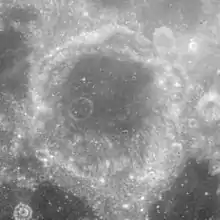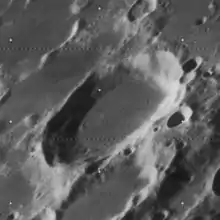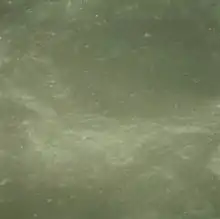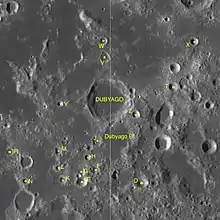Dubyago (crater)
Dubyago is a lunar impact crater that lies in the eastern limb of the Moon. It was named after Russian astronomers Dmitry Dubyago and Alexander Dubyago.[1] It appears significantly foreshortened when viewed from the Earth. It lies along the southern shore of the Mare Undarum, to the southeast of the crater Firmicus.
 Apollo 15 image | |
| Coordinates | 4.4°N 70.0°E |
|---|---|
| Diameter | 51 km |
| Depth | 2700 m |
| Colongitude | 291° at sunrise |
| Eponym | Dmitry Dubyago and Alexander Dubyago |


This crater has a somewhat worn outer rim which dips down to a low point along the northern rim, and has its maximum altitude along the eastern side. The most notable aspect of this crater, however, is the dark hue of the interior floor which matches the albedo of the lunar mare to the northwest. This darker shading makes the crater stand out somewhat from its surroundings.
Dubyago has an unusual number of satellite craters, several of which have since been given names by the IAU. The most notable of these is Dubyago B, which is nearly attached to the southeastern rim of the main crater.
The name of this crater has also been spelled Dubiago in some publications.
Satellite craters
By convention these features are identified on lunar maps by placing the letter on the side of the crater midpoint that is closest to Dubyago.
| Dubyago | Latitude | Longitude | Diameter |
|---|---|---|---|
| B | 2.8° N | 70.2° E | 36 km |
| D | 1.4° N | 71.2° E | 14 km |
| E | 1.3° N | 69.0° E | 12 km |
| F | 1.8° N | 69.4° E | 9 km |
| G | 1.8° N | 69.0° E | 9 km |
| H | 2.3° N | 69.2° E | 8 km |
| J | 2.9° N | 69.6° E | 11 km |
| K | 1.5° N | 68.2° E | 9 km |
| L | 1.9° N | 68.1° E | 7 km |
| M | 2.5° N | 68.1° E | 12 km |
| N | 1.4° N | 67.0° E | 7 km |
| R | 2.5° N | 66.3° E | 8 km |
| T | 4.8° N | 72.3° E | 9 km |
| V | 5.9° N | 70.0° E | 12 km |
| W | 6.5° N | 69.9° E | 9 km |
| X | 6.5° N | 73.0° E | 8 km |
| Y | 4.2° N | 68.2° E | 7 km |
| Z | 3.8° N | 70.9° E | 9 km |

The following craters have been renamed by the IAU:
References
- "Dubyago (crater)". Gazetteer of Planetary Nomenclature. USGS Astrogeology Research Program.
- Andersson, L. E.; Whitaker, E. A. (1982). NASA Catalogue of Lunar Nomenclature. NASA RP-1097.
- Bussey, B.; Spudis, P. (2004). The Clementine Atlas of the Moon. New York: Cambridge University Press. ISBN 978-0-521-81528-4.
- Cocks, Elijah E.; Cocks, Josiah C. (1995). Who's Who on the Moon: A Biographical Dictionary of Lunar Nomenclature. Tudor Publishers. ISBN 978-0-936389-27-1.
- McDowell, Jonathan (July 15, 2007). "Lunar Nomenclature". Jonathan's Space Report. Retrieved 2007-10-24.
- Menzel, D. H.; Minnaert, M.; Levin, B.; Dollfus, A.; Bell, B. (1971). "Report on Lunar Nomenclature by the Working Group of Commission 17 of the IAU". Space Science Reviews. 12 (2): 136–186. Bibcode:1971SSRv...12..136M. doi:10.1007/BF00171763. S2CID 122125855.
- Moore, Patrick (2001). On the Moon. Sterling Publishing Co. ISBN 978-0-304-35469-6.
- Price, Fred W. (1988). The Moon Observer's Handbook. Cambridge University Press. ISBN 978-0-521-33500-3.
- Rükl, Antonín (1990). Atlas of the Moon. Kalmbach Books. ISBN 978-0-913135-17-4.
- Webb, Rev. T. W. (1962). Celestial Objects for Common Telescopes (6th revised ed.). Dover. ISBN 978-0-486-20917-3.
- Whitaker, Ewen A. (1999). Mapping and Naming the Moon. Cambridge University Press. ISBN 978-0-521-62248-6.
- Wlasuk, Peter T. (2000). Observing the Moon. Springer. ISBN 978-1-85233-193-1.
External links
- LTO-62C2 Dubyago — L&PI topographic map
